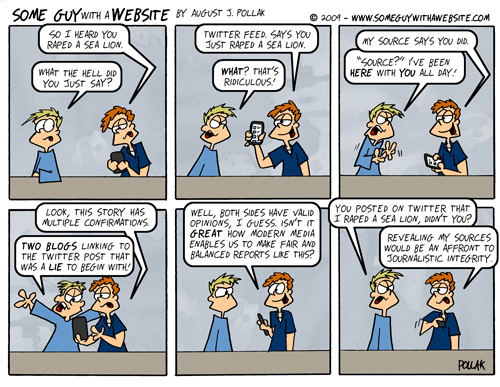 Life is full of stories. There are fictional stories told to entertain, stories told between friends, gossip between strangers, and then there are news stories shared with huge audiences. Each of these has value to someone, but a defining point between news stories and all the rest is the need for accuracy. News organizations pride themselves on being able to deliver the facts, objectively and accurately. They want the world to hear their stories and know that they can believe it. Reputations for fair and honest news are staked on the fact that stories being put forth have been checked and found true.
Life is full of stories. There are fictional stories told to entertain, stories told between friends, gossip between strangers, and then there are news stories shared with huge audiences. Each of these has value to someone, but a defining point between news stories and all the rest is the need for accuracy. News organizations pride themselves on being able to deliver the facts, objectively and accurately. They want the world to hear their stories and know that they can believe it. Reputations for fair and honest news are staked on the fact that stories being put forth have been checked and found true.Fact: humans are fallible. Fact: humans write news stories. By extension, the assumption can be made that news stories are likely to have mistakes in them. Journalists working at full speed to find news, write about it and then get it out to the public with minimal wait time is a recipe for error. We cannot deny that publications often run reprints and apologies for the inconsistencies that show up. The only thing we can do is to learn from mistakes and try not to make them in the first place. Just one mistake can be the catalyst for an audience to wonder whether everything you've written has been accurate. Megan Perras spoke on such outcomes of a mistake saying, "the reader no longer respects what they [the writer] writes, no matter how true or worthy their opinion."
In matters of accuracy, it is better to double check than to make a mistake. Being first to report something is important, but being accurate is even more so. The online Handbook of Journalism says, "It is our job to get it first but it is above all our job to get it right. Accuracy, as well as balance, always takes precedence over speed." What value does the fastest news have, if it is incorrect? None. Audiences may want speed, but even more so they want truth. When a reader doesn't know that they've been told something untrue, they will not know to check the fact. A journalist cannot let down their guard for even a moment. It is at such times when sloppy errors begin to discredit their byline. Always remember to be objective, be timely, but most importantly be accurate. The work you do is a reflection of your character. Audiences will recognize your diligence and respect you for it.
*note: image from huffingtonpost.com

Maybe you should have written your blog post about proper formatting, because your picture breaks it!
ReplyDeleteBut seriously, accuracy is very important and indeed vital to your success.